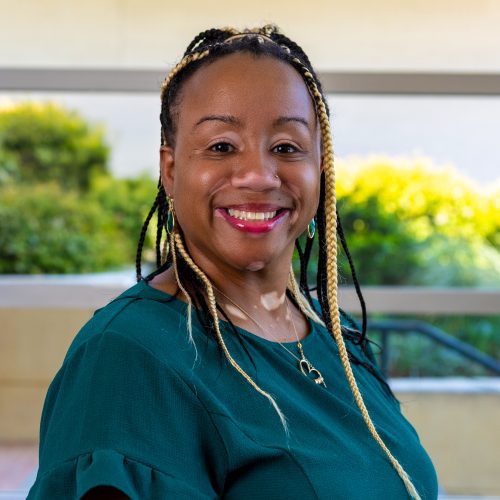Latonda Mitchell

- Current Graduate Program: Ph.D. in Curriculum and Instruction
- Concentration/Area of Emphasis: Urban Education
- Program Schedule: Part-Time
- Delivery Method: Hybrid
- Current Employer: Charlotte-Mecklenburg Schools
- Position: Elementary Social Studies Curriculum Instructional Specialist
- Anticipated Graduation: May 2026
- Undergraduate Institution: University of North Carolina at Pembroke
- Undergraduate Degree: B.A. in Elementary Education
- Favorite Place in Charlotte: Optimist Hall, Snooze, Romare Bearden Park, and First Ward Park
- Hometown: Salisbury, North Carolina
- Dream Job: Professor and Researcher
What has been your driving force for enrolling in your degree program?
I am currently pursuing a Ph.D. in Curriculum and Instruction with a concentration in Urban Education at the UNC Charlotte. This program emphasizes preparing scholars to address the unique challenges and opportunities within urban school systems by combining research, theory, and practice. My decision to enroll was driven by both professional and personal motivations. As an educator and curriculum specialist, I have seen firsthand how inequities affect urban students, particularly those from underrepresented backgrounds. I wanted to deepen my knowledge and research skills to contribute to solutions that center equity, representation, and student well-being. At the same time, my own experiences as a high-achieving Black woman navigating the pressures of perfectionism motivated me to pursue a program where I could amplify the voices of students facing similar challenges. This graduate program equips me with the theoretical grounding, research methodology, and mentorship needed to advance as both a scholar and practitioner. It is preparing me to conduct rigorous, culturally responsive research, contribute meaningfully to the field of urban education, and mentor future educators. Ultimately, it is helping me build the foundation for a career in higher education where I can advocate for equity in K–12 schools and positively influence how students and educators thrive in urban contexts.
If you work outside of UNC Charlotte, tell us about your career. What lessons have you learned in your courses that you could apply on the job?
Outside of UNC Charlotte, I serve as the Elementary Social Studies Curriculum Specialist for Charlotte-Mecklenburg Schools. In this role, I design and support K–5 curriculum, lead professional development for teachers, and collaborate with district and community partners to strengthen civic literacy and social studies instruction. My career has taught me the importance of adaptability, building teacher capacity, and ensuring that instructional resources reflect the diverse experiences of students.
Through my doctoral coursework, I have gained a deeper understanding of culturally responsive pedagogy, inclusive leadership, and qualitative research methods. These lessons have directly influenced my work by helping me approach curriculum development with a more critical lens, ensuring that resources not only meet standards but also affirm student identity and voice. I have also applied concepts of collaboration, reflection, and advocacy from my courses to strengthen professional learning communities and create spaces where teachers feel supported and empowered.
What has been the best part of your academic experience so far?
The best part of my academic experience so far has been the opportunity to grow as both a scholar and practitioner through meaningful mentorship and collaboration. Working closely with faculty and peers has challenged me to think critically, refine my research interests, and connect theory to practice in ways that directly impact my work in schools. I have especially valued learning in a community that prioritizes inclusivity and innovation, where my experiences and perspectives are not only welcomed but also help shape larger conversations about education. This sense of support and intellectual exchange has been instrumental in strengthening my confidence, broadening my perspective, and preparing me for the next steps in my career.
How would you describe UNC Charlotte to someone considering a graduate program?
I would describe UNC Charlotte as a dynamic and supportive place to pursue graduate study. The university offers the resources of a large research institution while still fostering strong, personal connections with faculty and peers. Graduate programs are designed to be both rigorous and relevant, encouraging students to apply what they learn directly to their professional and community contexts. What stands out most is the inclusive environment, where diverse perspectives are valued and students are encouraged to lead, innovate, and contribute to meaningful change in their fields.
Are you involved in any student organizations or clubs? How has your involvement in these organizations enhanced your graduate experience?
Yes, I am actively involved in the Charlotte Parent Organization, where I serve as the secretary. In this role, I help with communication, organization of meetings, and supporting initiatives that strengthen collaboration between families, schools, and the community. This work is especially meaningful to me as a parent of two young girls, because it allows me to advocate for the kinds of inclusive practices and opportunities I want them, and all children, to experience in school. Being part of this organization has enriched my graduate experience by giving me a direct connection to the lived experiences of parents and students in urban education contexts. It complements my academic interests by bridging theory and practice, helping me to consider how family and community voices can shape more responsive and supportive educational environments. This involvement has also strengthened my leadership skills, community partnerships, and commitment to ensuring that parent voices are included in educational decision-making.
What advice would you give to someone considering applying to your program?
My advice to someone considering applying to the program is to come in with a clear sense of purpose and be open to growth. The program is rigorous and deeply rewarding, but it requires you to balance coursework, research, and personal commitments. Take advantage of the mentorship opportunities; faculty and peers will challenge and support you in ways that will shape both your scholarship and your professional path. I would also encourage applicants to connect their studies to their passions and lived experiences, because that alignment makes the work more meaningful and sustainable. Finally, build a strong support system early; having a community to lean on makes the journey not only possible but transformative.